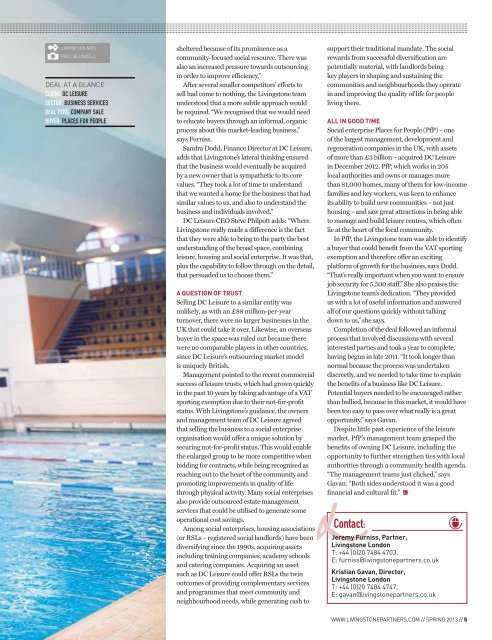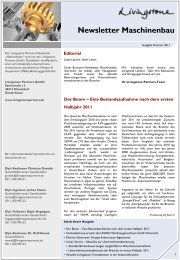Acquirer Spring 2013 - Livingstone Partners
Acquirer Spring 2013 - Livingstone Partners
Acquirer Spring 2013 - Livingstone Partners
You also want an ePaper? Increase the reach of your titles
YUMPU automatically turns print PDFs into web optimized ePapers that Google loves.
LAWRIE HOLMESPAUL BLUNDELLDEAL AT A GLANCECLIENT: DC LEISURESECTOR: BUSINESS SERVICESDEAL TYPE: COMPANY SALEBUYER: PLACES FOR PEOPLEsheltered because of its prominence as acommunity-focused social resource. There wasalso an increased pressure towards outsourcingin order to improve efficiency.”After several smaller competitors’ efforts tosell had come to nothing, the <strong>Livingstone</strong> teamunderstood that a more subtle approach wouldbe required. “We recognised that we would needto educate buyers through an informal, organicprocess about this market-leading business,”says Furniss.Sandra Dodd, Finance Director at DC Leisure,adds that <strong>Livingstone</strong>’s lateral thinking ensuredthat the business would eventually be acquiredby a new owner that is sympathetic to its corevalues. “They took a lot of time to understandthat we wanted a home for the business that hadsimilar values to us, and also to understand thebusiness and individuals involved.”DC Leisure CEO Steve Philpott adds: “Where<strong>Livingstone</strong> really made a difference is the factthat they were able to bring to the party the bestunderstanding of the broad space, combiningleisure, housing and social enterprise. It was that,plus the capability to follow through on the detail,that persuaded us to choose them.”A QUESTION OF TRUSTSelling DC Leisure to a similar entity wasunlikely, as with an £88 million-per-yearturnover, there were no larger businesses in theUK that could take it over. Likewise, an overseasbuyer in the space was ruled out because therewere no comparable players in other countries,since DC Leisure’s outsourcing market modelis uniquely British.Management pointed to the recent commercialsuccess of leisure trusts, which had grown quicklyin the past 10 years by taking advantage of a VATsporting exemption due to their not-for-profitstatus. With <strong>Livingstone</strong>’s guidance, the ownersand management team of DC Leisure agreedthat selling the business to a social enterpriseorganisation would offer a unique solution bysecuring not-for-profit status. This would enablethe enlarged group to be more competitive whenbidding for contracts, while being recognised asreaching out to the heart of the community andpromoting improvements in quality of lifethrough physical activity. Many social enterprisesalso provide outsourced estate managementservices that could be utilised to generate someoperational cost savings.Among social enterprises, housing associations(or RSLs – registered social landlords) have beendiversifying since the 1990s, acquiring assetsincluding training companies, academy schoolsand catering companies. Acquiring an assetsuch as DC Leisure could offer RSLs the twinoutcomes of providing complementary servicesand programmes that meet community andneighbourhood needs, while generating cash tosupport their traditional mandate. The socialrewards from successful diversification arepotentially material, with landlords beingkey players in shaping and sustaining thecommunities and neighbourhoods they operatein and improving the quality of life for peopleliving there.ALL IN GOOD TIMESocial enterprise Places for People (PfP) – oneof the largest management, development andregeneration companies in the UK, with assetsof more than £3 billion – acquired DC Leisurein December 2012. PfP, which works in 205local authorities and owns or manages morethan 81,000 homes, many of them for low-incomefamilies and key workers, was keen to enhanceits ability to build new communities – not justhousing – and saw great attractions in being ableto manage and build leisure centres, which oftenlie at the heart of the local community.In PfP, the <strong>Livingstone</strong> team was able to identifya buyer that could benefit from the VAT sportingexemption and therefore offer an excitingplatform of growth for the business, says Dodd.“That’s really important when you want to ensurejob security for 5,500 staff.” She also praises the<strong>Livingstone</strong> team’s dedication. “They providedus with a lot of useful information and answeredall of our questions quickly without talkingdown to us,” she says.Completion of the deal followed an informalprocess that involved discussions with severalinterested parties and took a year to complete,having begun in late 2011. “It took longer thannormal because the process was undertakendiscreetly, and we needed to take time to explainthe benefits of a business like DC Leisure.Potential buyers needed to be encouraged ratherthan bullied, because in this market, it would havebeen too easy to pass over what really is a greatopportunity,” says Gavan.Despite little past experience of the leisuremarket, PfP’s management team grasped thebenefits of owning DC Leisure, including theopportunity to further strengthen ties with localauthorities through a community health agenda.“The management teams just clicked,” saysGavan. “Both sides understood it was a goodfinancial and cultural fit.”Contact:Jeremy Furniss, Partner,<strong>Livingstone</strong> LondonT: +44 (0)20 7484 4703,E: furniss@livingstonepartners.co.ukKristian Gavan, Director,<strong>Livingstone</strong> LondonT: +44 (0)20 7484 4747,E: gavan@livingstonepartners.co.ukWWW.LIVINGSTONEPARTNERS.COM // SPRING <strong>2013</strong> // 5



